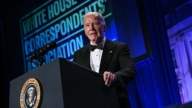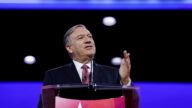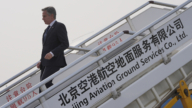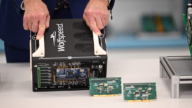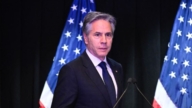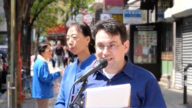【新唐人2012年1月27日讯】美国总统奥巴马日前发表大选前最后一份国情咨文,其中5次提到“中国”,都是有关对华贸易问题﹔并宣布设立一个新的贸易执法部门,调查中国等国家的不公平贸易行为。海内外学者指出,美国大选年奥巴马对华贸易姿态明显趋于强硬,可能引发美中贸易纷争加剧。
奥巴马总统的国情咨文涵盖了内政外交的重要议题,他承诺在创造就业、教育、移民、能源、医保改革等领域采取行动。在美国失业率高达8.5%的情况下,振兴疲弱的经济是奥巴马国情咨文的重点。
奥巴马明确提出“经济公平”的目标,他抨击金融诈骗、政府法规陈旧、贫富不均等问题,宣布将向富人征收至少30%的税款,并大声疾呼,“如果把富人税称为阶级战争,就让他们说吧。”
共和党总统初选的两个领先者罗姆尼与金瑞契,批评奥巴马是“左翼的意识型态”,还指出,高达7870亿美元的经济刺激方案失败,而加重税赋以及政府过度干预企业发展,结果是适得其反。
奥巴马在国情咨文中5次提到“中国”,态度趋于强硬,他说:“为了给美国产品打开新市场,我们提出的针对中国的贸易案几乎是上届政府的两倍,这样做收到了效果。”
英国BBC分析指出,奥巴马将寻求今年总统大选连任,这或许是他对中国措辞强硬的重要原因。“纽约城市大学”政治学教授夏明表示,中国议题是美国大选两党候选人的焦点话题。
夏明:“奥巴马显然第一大要务是振兴美国经济,他振兴美国经济现在关键是要制造就业,而制造就业也就是说美国的制造业必须振兴起来,现在面临一个很重要的挑战就是如何应对中国的竞争,他通过贸易保护主义一些措施,同时在自由公平竞争的情况想对中国的保护主义进行施压。”
奥巴马宣布成立贸易执法部门,制止中国等国家不公平的补贴出口产品,以及将侵权产品出口到美国。他举例说:“我们阻止了蜂拥而来的中国轮胎,使一千多名美国人今天得以有工作。”
自2000年以来美国对华出口年均增长15%,中国已成为美国增长最快的主要出口市场。随着中国通货膨胀、工资上涨和人民币升值,奥巴马表示,现在在中国做生意越来越昂贵。
国际货币基金组织1月25号向20国集团表示,计入通胀因素,过去3个月来,中国已允许人民币按年率计升值了19%,去年人民币升值了8%以上。
面对中国经济增长放缓,通胀高升,出口和制造业萎缩,以及欧洲债务危机,北京经济学家冯兴元等一些专家学者表示,2012年人民币汇率估计会在提升中双向波动。
冯兴元:“中国的人民币由于通货膨胀这么高,它本身就应该也有贬值的趋向,但是国际政治上它有这种要求升值的压力,这两种不同方向的合力,我估计人民币还是会有所提升的。”
美国商务部日前宣布,对中国出口的新能源风塔发起反倾销调查。此前,美国已对中国木制卧室家俱进行反倾销调查,等等。中国则对美国通用等部分品牌进口车征收反倾销反补贴税。
“中国社科院美国经济研究中心”主任肖炼表示,受到国内压力以及国际形势的变化,奥巴马对中国的政策已发生重大变化,美国战略重心向亚太转移,美中贸易等方面可能纷争会比以前更多。
新唐人记者秦雪、李元翰、孙宁采访报导。
Obama’s Policy on China: More Trade Disputes Expected
US President Barack Obama gave his State of the Union
speech before this year’s presidential race.
The speech mentioned about China five times,
all about trade related issues.
Obama announced to form a new Trade Enforcement Unit,
to investigate unfair trade from China, among others.
Scholars say Obama’ attitude on China is clearly toughening,
the US-China trade disputes may thus get more intense.
US President Obama’s State of the Union address
covers the important topics of domestic and foreign policy.
Obama pledged to take actions in areas of employment,
education, immigration, energy, health care reform, etc..
With 8.5% unemployment rate, revitalizing the weak economy
was the focus of Obama’s State of the Union address.
Obama clearly stated the goal of “economic justice."
He slammed problems like financial fraud, government’s
obsolete regulations, and disparities in wealth.
He announced the rich should pay at least 30% income tax.
Obama said, “Now, you can call this class warfare all you want.
But asking a billionaire to pay at least as much as his secretary
in taxes? Most Americans would call that common sense.”
The two leading candidates of Republican presidential
primary Romney and Gingrich, criticized Obama.
They called Obama’s words “left-wing ideology," and said
the US$ 787-billion economic stimulus package had failed.
Moreover, the increased taxes and excessive governmental
interference with enterprises’ development will be counter-productive.
Obama mentioned “China” or “Chinese” five times
in his speech, showing an attitude toward a tougher line.
He said, “We’ve brought trade cases against China at nearly
twice the rate as the last administration – and it’s made a difference.”
BBC analyzed that Obama will seek this year’s presidential
re-election, this maybe an important reason for his toughness.
Ming Xia, Political Science Professor, City Univ. of New York,
says China issue is a hot topic for US presidential candidates.
Prof. Xia Ming, “Clearly Obama prioritizes the revival
of the US economy, the key is to create jobs.
That relies on the US manufacturing’s revitalization.
So, it’ll face an important challenge.
How to deal with competition from China?
He passed some protectionist trade measures.
Meanwhile, he wants to press China’s protectionism,
for free and fair competition."
Obama announced to form a Trade Enforcement Unit.
This will help stopping unfairly subsidized and infringing
products imported from China and other countries.
He gave an example, “Over a thousand Americans are
working today because we stopped a surge in Chinese tires."
Since 2000, annual US exports to China have risen by 15%.
China has become US’ fastest growing major export market.
With China’s inflation, rising wages and RMB appreciation,
doing business in China is getting more expensive, he said.
On January 25, the IMF said that over the past three months,
RMB has appreciated by 19% at annual rate adjusted for inflation.
In 2011, RMB appreciated over 8%.
China is facing slowing economic growth, rising inflation,
shrinking exports and manufacturing, plus the EU debt crisis.
Beijing-based economist Feng Xingyuan and some experts
expect RMB’s exchange rate fluctuations to improve in 2012.
Feng Xingyuan: “China’s inflation is so high, RMB in itself
should also have a trend in depreciation.
But internationally, the political pressure requests
its appreciation.
Considering the forces from these two different directions,
I expect RMB will still show a trend of appreciation."
The US Dept. of Commerce announced anti-dumping
investigations on wind towers exports from China.
Earlier, the same probe has been carried out
on China’s wooden bedroom furniture, among others.
In contrast, China levied anti-dumping and countervailing
duties on some US imported cars’ brands.
Xiao Lian, director of Chinese Academy of Social Sciences
Research Center, expects changes for Obama’s China policy.
The US has shifted its strategic focus toward the Asia-Pacific,
thus more US-China trade disputes can be expected.
NTD reporters Qing Xue, Li Yuanhan and Sun Ning


